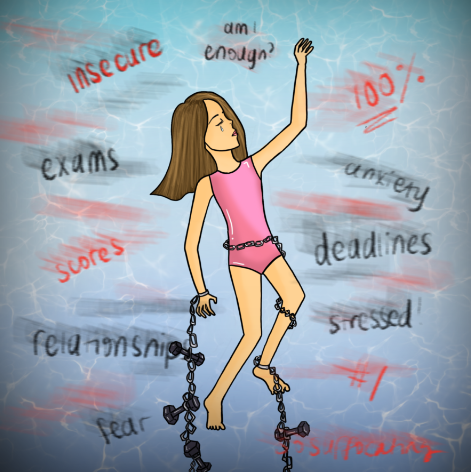How do Sports Affect Athletes Mental Health

This photo highlights the struggles athletes face.
February 27, 2023
According to the cdc.gov website in an article titled “About Mental Health”, mental health includes our emotional, psychological, and social well-being. It affects how we think, feel, and act. It also helps determine how we handle stress, relate to others, and make healthy choices. Mental health makes a big impact and is important from childhood through adulthood.
Playing on a sports team in high school can be both beneficial and detrimental to athletes. The pros of sports include having to deal with lots of responsibilities, being disciplined, learning patience, and being coachable.
The cons include economic problems such as not being able to pay for team accessories, not having rides to practices, and having to pay for insurance. These issues affect an athlete’s mental health by causing stress.
Basketball head coach for varsity “Coach Govea” makes sure that every single player on his team is okay and checks up on their mental health. He is a mentor to the team’s basketball players and says he makes sure they are focused and well.
Basketball coach for JV Coach Eric says “Mental health is always a challenge during the season. It is important to look at each player’s body language. If anyone were to have mental health issues I will try and understand their point of view and put it into a positive perspective.”
“The pressure of basketball affects my mental health because when I fail, I start to think negative thoughts about myself” says basketball player Tavarius Pittman. High expectations from coaches make you feel pressured, this causes the fear of failure, negative thinking and under performance.
Girls’ basketball player Nalaya Prieto on how the pressure of sports affect her mental health she says, “Personally I base my happiness based off my performance for basketball because it’s what I love to do, it gets overwhelming, and I start to tell myself I could have done better and doubting myself even more.” Letting yourself down can be overwhelming especially when you know what you could do.
Injuries can also affect an athlete’s mental health. “I would fall into a depressive state or a stage of sadness depending on how bad of an injury it is.” says Basketball player and football player Miguel Charles. “Basketball and Football are some of the most important things to me, I want them to be in my future.” Not being able to play the sport you love can be draining because there is no other activity or sport that can make you as happy as how your sport makes you feel.
Injuries can play a huge role in an athlete’s happiness. Former Football player Christian Rodriguez says, “When I get hurt it affects my mental health because I would have to recover and sit down during a game or practice can be very exhausting watching everyone play but I can’t due to an injury. I will start to think about the injury and ways I could have prevented the injury.”
Expectations in sports are lower for women than men, and this can affect a female athletes mental health. Soccer player Rosa Delarca believes they are lower because “we are known to be weaker.” A lot of girls in sports experience this which can make them believe they are not good enough, However Rosa says this makes her want to be better at sports and “exceed what society expects my athletic performance to be.”
Not being able to be happy playing the sport you love due to a coach is a horrible feeling as an athlete that strives to be the best they can. Basketball player Joseph Murillo states that bad coaching can also affect your love for your sport. He says, “Bad coaching does affect your love for the sport because you begin to question if your good enough or to play for anybody at all, at the same time when you have a bad coach it makes you strive to be better.”
Girls’ basketball player Nalaya Prieto on if bad coaching can affect the love for your sport. She says, “Bad coaching does affect my mental health because my coach can tell me I performed well, yet as soon as I make a mistake, he gets frustrated, but others can make 10 mistakes and keep them in the game”. That can make a player feel useless or not feel as important to the team. However, she says “it messes with your head because you go from wanting to achieve and perform well to mentally and physically getting frustrated and start giving up.”




